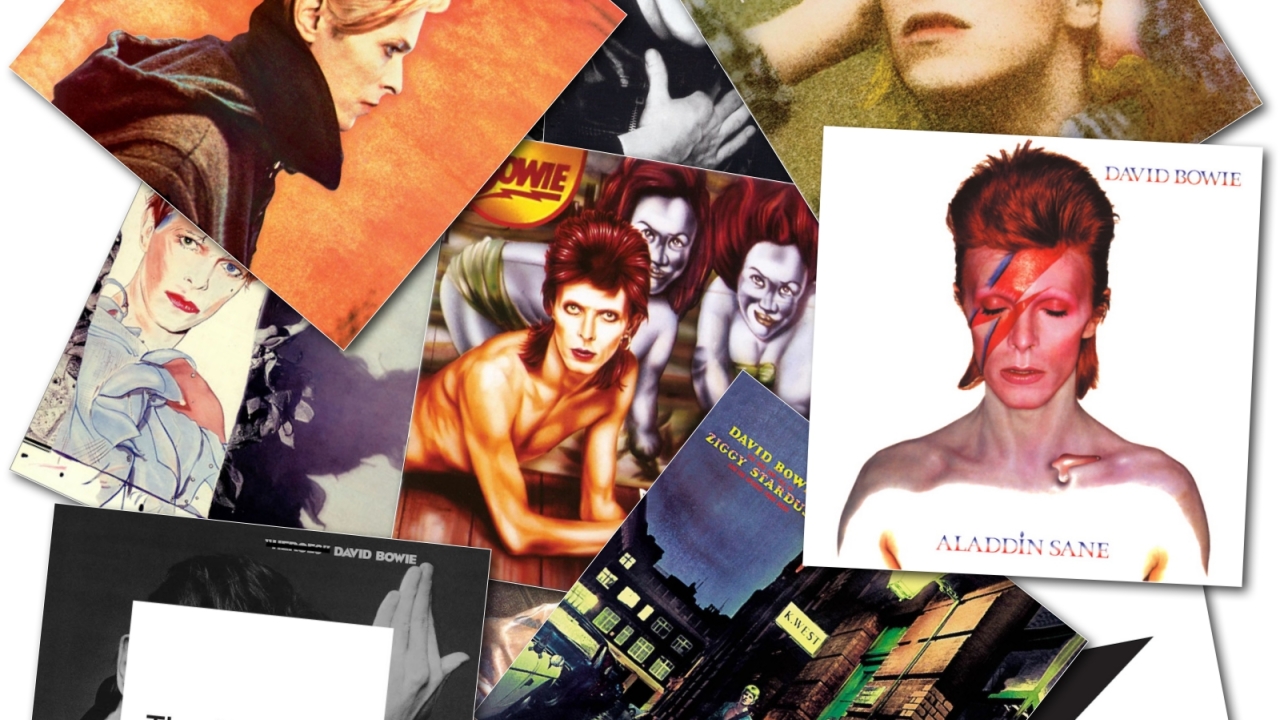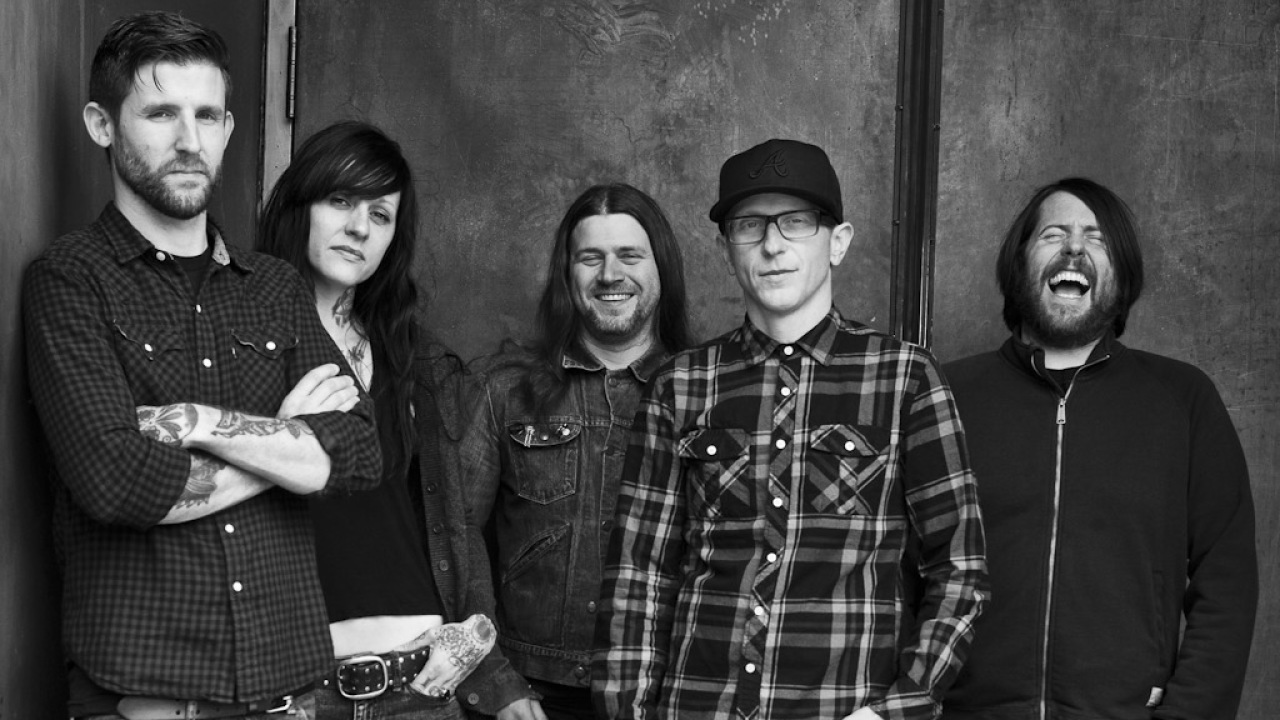During a recording career spanning almost five decades, David Bowie released 25 studio albums, two albums with Tin Machine, nine live collections, six EPs and 120 singles.
His influence reached far and wide, as evidenced in this special playlist curated by members of The Mission, Converge, Fish, Ginger Wildheart, Mike Vennart and more. Listen, enjoy and comment below…
LAZARUS (Blackstar, 2016)
Jacob Bannon, Converge: “David Bowie’s output and creative drive was staggering. I was fortunate to see him play on the Sound + Vision tour in 1990 at Sullivan Stadium in Massachusetts and it was a powerful experience for me. A friend recently told me about his philosophy on creating music and art, and how he rarely went back to a song after it was finished it. I admire that way of thinking and forever pushing forward. I try to apply that to my process as much as I can. I wanted to choose Lazarus from his latest album. I feel that it is important to respect that his work was always evolving and there was always substance to it, even in his later years. Lazarus has a simple melody and is undeniably emotionally jarring.”
WHERE ARE WE NOW? (The Next Day, 2013)
Hotei: “No words can describe how much David Bowie has inspired me in life. It was such an honour to have had a chance to stand on the same stage and perform together, even if it was just for one song. I will treasure that moment for the rest of my life. I shall never forget his philosophy — take challenges from changes.”
MY DEATH (Santa Monica ’72, 1994)
Arthur Shepherd, Unwed: “I’ve tortured so many people with the song by making them listen to it over and over. It’s a cover, I know, but it’s a brilliant cover. Just Bowie, his guitar and piano accompaniment. Throughout my teens, I had no idea it was a cover, until I started working at a record store called Rebel Rebel in NYC. My boss and biggest Bowie collector in the world (the Bowie stuff in the store was his doubles), informed me it was not a Bowie original and proceeded to introduce me to the world of Jacque Brel, which I fell in love with. Bowie had great taste! Because it was never an album track, this song is often over looked – but it is a must on any Bowie Playlist.”
ASHES TO ASHES (Scary Monsters (and Super Creeps), 1980)
Matthew Veck-Gilodi, Deaf Havana: “Ashes To Ashes encapsulates perfectly everything I love about David Bowie as an artist. From the opening grooves with that ethereal synth line to the haunting refrain of ‘I’m happy, hope you’re happy too’. The production on the track is fantastic, holding up excellently when compared to many more modern works, and I can hear that influence in many artists that I know and love today. It’s just perfect Bowie, unflappably original, always unique - and like so much of his work, transcending genres and never even coming close to sounding dated. In a similar vein to anything he did, not just in music, but in fashion and film – it couldn’t have come from any other person on the planet. What a hero.”
ALADDIN SANE (Aladdin Sane, 1973)
Mike Vennart, Vennart/Biffy Clyro: “I always avoided the glam years as I assumed they wouldn’t be my thing. I thought they’d be too garish and to straight-ahead pop-rock. What a fool. The title track of the Aladdin Sane album is a sort of mangled, trippy, cocktail swagger through Bowie’s psychosis during his new found fame. It’s got some weird chord sequences in it, but its inclusion here is as much for that piano solo, courtesy of the extra-terrestrial Mike Garson. I imagine Bowie with that shit-eating grin, egging Garson on to get even crazier and crazier. I’d love to cover this tune if only to try and translate that solo to guitar. For, like, 20 minutes.”
THE BEWLAY BROTHERS (Hunky Dory, 1971)
James Monteith, Tesseract: “Like most people my age I was introduced to Bowie via the film Labyrinth (and my mum’s obsessive crush on him), but I didn’t become an actual fan in later life when I worked back and found some of his obscure and diverse gems – The Bewlay Brothers being one of them. This is a dark, eerie track: the foundation of melancholic guitar chords is layered with a gentle tremolo guitar parts and various other sounds, and mixed with a clever use of stereo panning which was probably quite revolutionary at the time. The quirky timbre of his voice is thoroughly exploited with a spine tingling effect, and the outro is probably one of the most haunting passages of popular music from that era.”
SOUND AND VISION (Low, 1977)
Jamie Jazz, The King Blues/Bleach Blood: “What can I say about David Bowie that hasn’t already been said? Something about his back catalogue of simply amazing, genre-defying songs or his influence on the world of music, theatre and fashion? Maybe his uncanny ability to reinvent himself and be able to stay one step ahead of everyone else throughout his illustrious career? I could even touch upon his influence on me as young man confused about his overly feminine ways in the dying days of how a ‘man should be a man’ and how seeing Bowie’s disregard for obeying traditional gender roles made it OK for me to be a total weirdo in the eyes of others.
”For my track choice, I’ve decided to go for a song that I don’t usually hear Bowie fans talk about all that often: Sound And Vision. I’ve heard that he wrote this about the effects of his drug habits at the time, however I personally think it is simply about writer’s block and if that is the case then, as any artist will know, being able to write such an amazing song about not being able to write is a truly brilliant feat. It’s not only a celebration of Bowie’s uncanny ability to find poetry in every situation, but also a testament to his prowess as a phenomenal musician. Viva Bowie.”
FIVE YEARS (The Rise and Fall of Ziggy Stardust and the Spiders from Mars, 1972)
Fish: “In the 70’s, I more or less turned my back on the then fashionable glittery glam rock but always had an ear on David Bowie. When I went to Aylesbury to join Marillion in early 1981, I couldn’t help but become aware of his history with the town as his first gigs were at the local Friar’s club and it was there that Ziggy was born. I was then a young Scottish singer on the threshold of the dream, but on those long dreary unemployed days, I’d often find myself camped up in a small cafe with the bass player cadging free coffees from the owner, a huge Bowie fan, who in return for his generosity would brainwash us into the Cult of Bowie by playing his vast cassette collection on the cafe’s tinny sound system. That was when I began to realise what an outstanding songwriter he was, and for me more importantly, a brilliant lyricist who would become a large influence on my own writing.
”Hunky Dory in particular became an all time favourite album but it was Five Years that became my favourite song. I’d eventually record it on mySongs from the Mirror album in 93 which was influenced by Bowie’s own covers project Pin Ups. I always figured the song was about his early days in Aylesbury as it referenced the Market Square and what I thought was the standard length of a record contract. It felt like it was about the alienation of fame and the powerful character observations he captured in the words and the poignant build into a drowning anthem I always considered a beautiful but simple structure and a perfect piece of songwriting.”
HEROES (Heroes, 1977)
Ginger Wildheart: “Drive In Saturday was the first single I ever bought. But Heroes was, in my opinion, the perfect musical achievement. His comeback in 2013 was an experience so rewarding that it returned in me a lost magic and the deep importance of truly irreplaceable stars. And even his death was typical in its stylish orchestration and heroic beauty. To paraphrase a Tony Benn quote: David Bowie taught me how live and how to die, and you can’t ask any more of a person than that. We are honoured to have lived at a time of such legends.”
I’M DERANGED (REPRISE) (Lost Highway OST, 1997)
Wayne Hussey, The Mission: ”There are literally hundreds of great songs I could have chosen but I thought I’d go for this one. It came out at a time when Bowie’s star wasn’t flying quite as high as it once had or would again. To me, it was clear from this track, which was originally released on the Outside album, that Bowie was searching and probing the musical landscape for rehabilitation. His voice is incredible on this – as it almost always was – and I love the way the music is skittish and deranged (as in the title), whilst his relaxed voice kind of floats above the mayhem. And what an opening line: ‘It’s funny how secrets travel’.
”Bowie has been omnipresent in my life since I was a young teenager. It’s unfathomable to me that he won’t be anymore. Of course, we’ll always have his music, his art, his legacy, but there will be nothing new from him anymore. He made this last album knowing full well what was happening to him and, just like his life, he has made his death a work of art too. Genius is too small a word for the man. I’m devastated, stunned, but the overriding feeling for me is one of privilege to have lived at a time when I saw and witnessed his rise – excuse my pun – with Ziggy and onwards. He was our generation’s Elvis, Beatles and Dylan. I went to see his V&A exhibition when it came to São Paulo a year or so ago. I spent all day there from the moment it opened to the moment it closed. Amazing, brilliant, awe inspiring and a privilege. Yeah, there’ll be eulogies for days, months and years, and quite rightly so. All I can really add to all of that is without ever meeting him, I loved, sorry, love David Bowie and always will. A little bit of me also died with the news.”
REBEL REBEL (Diamond Dogs, 1974)
Will Gould, Creeper: ”I was crushed to hear of the passing of David Bowie. He was my hero and will forever be remembered as a visionary and master of his craft. It’s incredibly difficult for me to pick a favourite song, but I’ve chosen Rebel Rebel. The song all centres around that incredible riff, surely one of the most recognisable of his entire career. Though released on his 1974 LP Dianond Dogs, I think it was actually supposed to have been on Ziggy Stardust and The Spiders From Mars, which makes sense considering its glam rock content. It always reminded me a little of The Rolling Stones, I have vivid memories of dancing around my bedroom as a 14-year-old to this song. Being such a small, effeminate kid at school, ‘Got your mother in a whirl, she’s not sure if you’re a boy or a girl’ spoke to me in exactly the same manner I imagine it did the youth of the late 1970’s. In my head, David was just like me. He was a very skinny young man, felt very alienated and different. What set us apart was his confidence, something that while listening to this song I could tether for a moment.”
FUTURE LEGEND (Diamond Dogs, 1974)
Nate Newton, Converge/Old Man Gloom/Doomriders/Cavalera Conspiracy: ”When I was five years old, my parents were cool and let me use their turntable. I remember distinctly being enthralled by the cover of Diamond Dogs. I put the record on the turntable and Bowie’s creepy narration overFuture Legend started and I was genuinely scared. Then came the roar of the crowd and the proclamation, ‘This ain’t rock’n’roll, this is genocide!’. I didn’t know how to vocalise what I was feeling but now I know it was ‘WHAT THE FUCK AM I LISTENING TO? AM I GOING TO DIE?’. I think this moment set me on the musical path I’m still on today.”
SHE SHOOK ME COLD (The Man Who Sold The World, 1970)
Ben Ward, Orange Goblin: “As a kid, David Bowie used to freak me out and interest me in equal measure – and I think that was the point. My first memory was seeing the creepy video for the song Ashes To Ashes with David wearing a Pierrot-style clown outfit walking towards the camera in a funereal style. That struck a chord with me and I grew up surrounded by his music. It was everywhere as a kid in the early 80s: on the radio, in the pubs and on Top of The Pops – and I liked it all. As I grew older, I started to explore his older material and fell in love with albums such as Hunky Dory, Aladdin Sane and Ziggy Stardust… but it’s the album The Man Who Sold The World that I love the best.
”Here, I’ve chosen the song She Shook Me Cold because it was Bowie’s heaviest song. It had a Sabbath-esque guitar tone and bass sound, but I could have chosen any of them really. Black Country Rock, The Width of A Circle… they all rule. I don’t think we can overlook the influence that David Bowie had on metal. I’d wager that a lot of them first picked up a guitar because of David Bowie. He was a visionary, a musical and lyrical genius. He was an outsider that never rested on his laurels and constantly pushed the limits, right up until his death. Like Lemmy, we will never see the likes of David Bowie ever again. Thank you for the music, Starman.”
Listen to the songs on our Spotify playlist: The David Bowie Playlist












